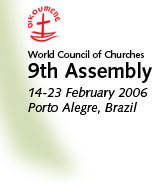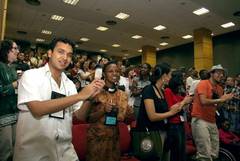 |
WCC > Home > News & media > News | ||||
| About the assembly | Programme | Theme & issues | News & media | |||||
 |
|
||||
|
13.02.06
Youth unite voices at pre-Assembly event
More articles and free photos at
In the months leading up to the World Council of Churches 9th Assembly, much was made of a desire to include large numbers of young people and to make their voices heard.
A Youth pre-Assembly meeting in Porto Alegre 11-13 February began to put a face on that goal. About 250 youth participants (defined as those aged 30 and under) gathered to connect, learn, share, and see how they might indeed have an impact over the next two weeks.
Events included community-building, sharing in small "home groups", regional meetings, daily prayers and Bible study, and preparation for the Assembly, as well as late-evening outings sponsored by local Brazilian youth groups.
"The community building piece really is the important one," said Lara Blackwood, a steward from the Disciples of Christ in the United States. "For us to be able to be comfortable enough to speak (in this forum) can be hard. Having that community built so we don't feel like we're speaking alone is really empowering."
General secretary Rev. Dr Samuel Kobia addressed the group in a packed auditorium one evening, sharing reflections on youth involvement in the WCC.
"(The Assembly) can transform you, and you can transform the Assembly as well," he said. "Without young people, we cannot have the kind of challenge that has kept the ecumenical movement active and relevant."
Kobia suggested goals of having youth elected as one or more regional presidents and as a significant part of the WCC central committee.
Most youth seemed to embrace enthusiastically the challenge of having an impact on the assembly and the WCC as a whole. A more difficult question arose on how to do that. Changing a decades-old institution with a complex structure doesn't happen easily.
"I'm hearing these words about renewal of the ecumenical movement, but I'm looking for a tangible framework for change and I'm not seeing it yet," said Alison Preston, a youth delegate from the Anglican Church of Australia.
Preston said much good has come from the ecumenical movement, but it may be time to reconsider its structure for a new era. Youth, she added, may be able to take the lead in that reconceptualizing.
"If we really are open to transformation, we could look to successful movements that have emerged in recent years", she said, pointing to models such as the Make Poverty History campaign. "People worry that ecumenism itself might be dying, but it's not - it's just the form."
Youth were already mobilizing for some change by the end of the pre-Assembly gathering. With regions often reticent to nominate youth for WCC president positions in the past, youth suggested the idea of a global representative from the youth community who would serve as a WCC president.
About 15 percent of delegates at the Assembly are expected to be youth, and 150 youth stewards will assist its operation. Another 250 Latin American youth will participate in a camp nearby. All youth, delegates or not, have been invited to participate fully in all ecumenical conversations.
Assembly website: www.wcc-assembly.info
|
|||
|
|
|


